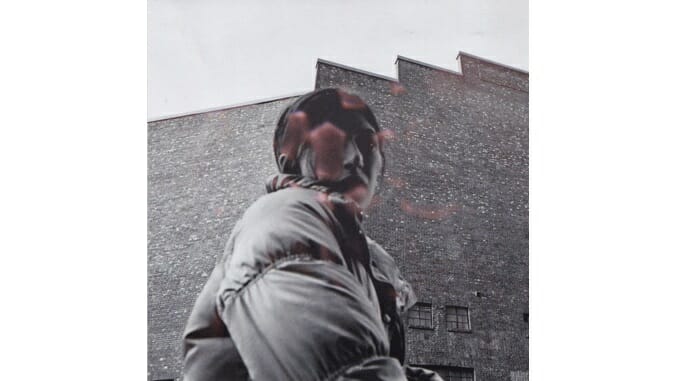Aldous Harding Breaks the Mirror on Warm Chris
On her new album, the New Zealand folk auteur uses an expanded sonic palette to consider intimacy and performance

In 2017, New Zealand’s Aldous Harding erupted into indie-folk consciousness with Party, her second album and first release after being signed to 4AD. With tracks like the surreal, violent “What If Birds Aren’t Singing They’re Screaming” and the terrifying vulnerability of “Imagining My Man,” she earned praise for her singularly elastic voice, flowing between a rich contralto and playful falsetto.
2019 brought Designer and “The Barrel,” a nonsensical romp through relationship anxieties and morbid natural imagery that she has famously refused to define since its release. The song earned Harding an international breakthrough, as well as a brush with indie virality. Its music video takes the viewer through a womb-like fort to reveal Harding dressed as a pilgrim. She dances disjointedly, but maintains confident eye contact with the camera, performing awkwardness but serenely holding onto the cards.
On “Tick Tock,” an early track on her new album Warm Chris, Harding again addresses the absurdity of interpretation. “Wanted to see me, now that you see me, whatcha gonna do?” she taunts in the refrain, defying her witnesses to comprehend her. Her voice-play finds her evoking both Cat Power and Annie Lennox, sliding from the husky lament “Oh, the dirty of it” to a reedy cry of “Party people!”
The new album continues Harding’s creative partnership with producer John Parish and evolves her sonic treatment of this Dadaist bent. The sparse instrumental backings of Party and Designer are elevated with a palette that draws from freak folk and baroque piano pop—it’s easy to sift out the influences of Sufjan Stevens and Kate Bush. Warm Chris thrives in that new flexibility, using Harding’s expanded sound to consider the implications of professional and interpersonal performance in turns across its 10 tracks.
“Fever,” for instance, addresses a partner directly, offering a jaded suggestion that “we did what the other expected” while simultaneously urging, “don’t give up at the easy part, now.” Though seemingly frank, Harding pulls the rug out from under the listener with lyrics that could suggest everyday relationship troubles, or the parasocial link between audience and performer. The music video created by Harding and Martin Sagadin heightens the mystery, centering on cozy quilts, inscrutable Scrabble tiles, and close-ups of strangers dancing and embracing. “I still stare at you in the dark,” Harding reminds us, furiously tap-dancing.
Harding’s video collaborations with Sagadin date back to “The Barrel,” and they add another dimension of mystery and meaning to her work, particularly alongside the music of Warm Chris. Sagadin themself performed as a proxy for Harding in last year’s video for “Old Peel,” and appears as a juggler in their recent music video for “Lawn.” Alongside shots of Sagadin performing for seemingly no one, Harding and a chiseled, blond man—Chris?—face each other in clean 1950s outfits, suggesting an Old Hollywood romance, but never actually making eye contact. Their disconnect is emphasized when the pair morph into giant, tree-climbing lizards, their heads turned sharply away from each other.
“Lawn” also invokes performance in its lyrical interrogation. Presenting an unhinged, post-capitalist yard sale, Harding repeatedly asks, “Can you imagine me, just being out and free?” while directing, “Your b-sides are on the lawn.” “How are things with me? All these lamps are free,” she quips. Is she discarding the ephemera of an unfulfilling partnership, or excoriating the bounty of an empty profession? Either way, she insists, “They don’t mean a thing to me.”
After all this aplomb, the title track “Warm Chris” lands unexpectedly tenderly, drawing more tension from the baits and switches of navigating an intimate relationship than from its own abstraction. Harding demands commitment from her titular partner, then dismisses herself off-handedly, remarking, “Kidding, I can’t spell.” Later, she stiltedly confesses, “I’ve got the love for you now.” The childlike approach suggests both the beauty and horror of shedding inhibition. “Chris” himself finally arrives, too, as a character in absence—a more mature, affectionate counterpart to Harding’s persona, from whom we never actually hear at all.
Toward the end of the album, “She’ll Be Coming Round The Mountain” builds on these intimacy anxieties to turn a childhood sing-along into an arresting rumination on doubt and self-destruction. It’s on this track where Harding seems to discard her audience. After considering the meta-theatrics of professional and everyday performance, she turns her focus inward to baldly consider the ways she has hurt and been hurt by these relationship rites, over a distorted banjo backing and ominous piano chords. She confronts her inner child, then faces a frightening revelation about what her experiences might mean for accepting intimacy in the future: “When it comes to eating time, how will I know the meal is mine?”
Annie Parnell is a host and writer based in Richmond, Virginia. Her writing has appeared in The Boot, PopMatters, Audiofemme and elsewhere. She can be found identifying native plant species in her backyard, on Twitter at @avparnell, or at her website, avparnell.wordpress.com.







































